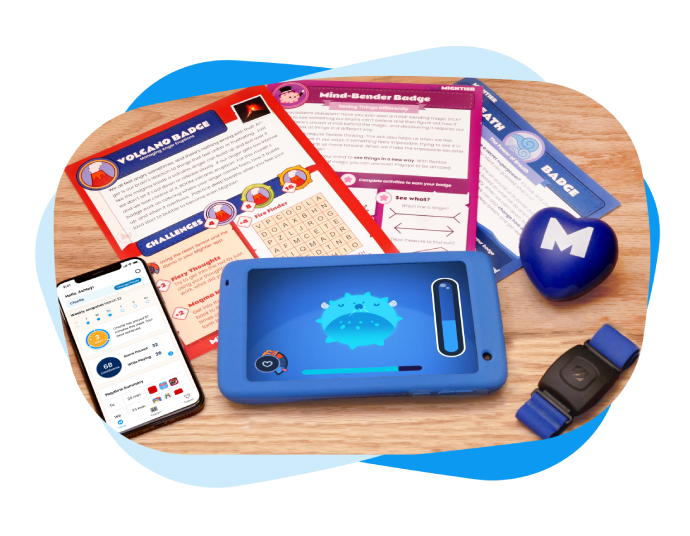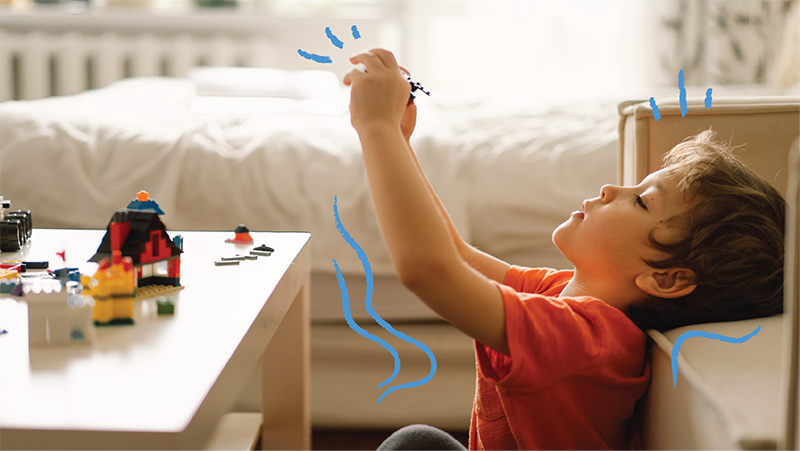“Fish swim, birds fly, children play.” [Dr. Garry Landreth]

Play is how children make sense of their world. Playing creates a safe space for children to communicate, solve problems, make mistakes, and learn to work with others.
Play-based learning models have been proven more effective for children’s learning than traditional approaches like direct/explicit instruction.
And this makes sense! Children are motivated by play. They want to play. Leveraging children’s natural curiosity and interest to create hands-on exploratory moments is where the highest level of learning occurs.
There are many different types of play:
- physical play
- fantasy/pretend play
- games
- symbolic play
- and more!
The newest addition to the playground is digital play. This occurs when children use a device to engage in play.
Digital play can act as a tutor or guide to teach concepts and can be personalized so that children practice at their own pace in a safe space.
Another benefit of digital play is that it is scalable and can reach a wide and diverse audience, transcending geographical boundaries and accessibility limitations.
Digital play is a powerful learning tool that has taken off in classrooms. Teachers know the power of play and personalized feedback to support children’s learning. The EdTech market is a $130 billion dollar industry ripe with opportunities. But where else can digital play be used to support children?
Digital gaming and the children’s mental health space
The children’s mental health space offers many play-based options. Between play therapy, expressive therapy, occupational therapy, and social skills groups, there are lots of ways for kids to explore their emotions and practice coping skills.
These approaches hone in on some important elements of play-based learning:
- personal expression
- creativity
- movement
- fun
But they all come with the same limitations – they require a professional to deliver the care, and they require the child to travel. These two elements, as we know, create natural barriers for those who cannot access these types of therapies for financial or logistical reasons. That means that direct-service therapeutic approaches are not only difficult to scale, but they are also difficult to access.
Enter digital play and the delivery of therapeutic programming and evidence-based approaches through scalable, accessible, child-centered mental health care.
5 ways digital gaming can be used to promote children’s emotional well-being
- Enjoyment
- Let’s be honest: not all kids enjoy or want to engage in therapy. This makes sense, as talking about emotions isn’t necessarily fun or easy. But when therapeutic practices are wrapped up into digital games where kids can explore, problem-solve, and feel a sense of mastery and reward over their experience, mental health care becomes enjoyable. It’s natural, familiar, and fun. It doesn’t have to be something they dread or fear.
- Comfort and Safety
- Engaging with one’s thoughts and emotions requires a certain level of vulnerability. It’s important that children feel safe and comfortable as they do this. With digital games, children can play, learn, and explore from the comfort of their homes. No strangers or intimidating doctor’s offices.
- Repetition and Skill Building
- Knowing coping and calming skills is great, but the brain and body’s ability to remember, access, and use those skills diminishes during heightened emotional states. Emotional regulation is not something that is learned through talking; it is learned through doing. It must be practiced. Digital games provide children countless opportunities to practice this skill through gameplay, allowing children to build muscle memory for emotional regulation.
- Personalization and Customization
- No two children are the same, which means digital therapeutic approaches must allow for all types of children, players, abilities, and play styles. Digital games can do this by enabling children to play at different levels, customize characters, and tailor the experience to fit their specific needs.
- Scalability and Accessibility
- This is a big one. Parents want effective, affordable, convenient care for their children. Care that does not meet these requirements only creates additional stress and frustration in families’ lives. But, when care is delivered digitally, children can play and learn wherever and whenever without wait times or long commutes.
Mightier is an evidence-based digital program for kids that uses games and biometric feedback to let kids explore their emotions and build coping skills through play.
How Mightier works
- Visualize
- Kids play games while wearing a heart rate sensor to see their emotions in real time.
- Practice
- As kids become frustrated, stressed, or over-excited, they learn strategies to calm down and regulate their emotions.
- Apply
- By practicing strategies in the game, they build a toolbox of coping strategies to use in real life.
Using a child-centered approach and creating programs for children that understand and value children’s natural inclination and interest to play is critical to support children’s well-being.
Mightier has reimagined mental health support for children by pairing the principles of play-based learning with evidence-based coping strategies to create an interactive experience.
Curious how you can get Mightier into the hands of your employees or members? Learn more here















